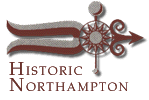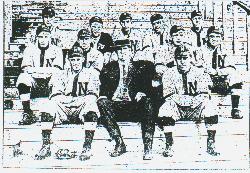

|


Northampton Baseball V: 1909-1915- The Connecticut League and Twin State League

Minor league baseball made its Northampton debut in 1909. Gil Edwards, owner of the Lyric Theater, and Goldie Bowler, a former pitcher for the Springfield Ponies, purchased the Meriden club of the Connecticut League for $2000 and moved the operation to Northampton.
After renovating the Driving Park and moving home plate nearer the grandstand, the Northampton Meadowlarks played a 112 game season. With Bowler as manager for the first season, the Meadowlarks finished seventh.
The Larks barely survived financially. Blue laws prevented playing on Sundays; games were held during the day when most fans were at work. Yet on holidays and Saturdays large crowds took the trolley with its sign, "Base Ball Today" to see the game. General admission was 25 cents, children paid 10 cents, and it cost extra to sit in the covered grandstand (a structure used even today during the thoroughbred racing season at the Three County Fair).
In 1910 first baseman Bill Luby replaced Bowler as manager, but the Meadowlarks' fortunes failed to improve, and the Larks finished seventh again. In June 1911, with Luby still at the helm, the Connecticut League ejected the Northampton and Holyoke clubs for "failure to pay their debts." Northampton players went home unpaid or were recruited onto other teams.
A few of the 1909-1911 Larks went on to play in the major leagues, most notably Jimmy Walsh (Philadelphia Athletics). Fan favorites included Bill Yale, Jimmy Burns, Ira Plank (Eddie Plank's brother), "Tacks" DeLave, and "Steamer" Flanagan.
Northampton wasn't through with the minor leagues. Over the winter of 1911-1912 the Northampton Baseball Association solicited subscriptions (including $2.00 from Calvin Coolidge), and the Meadowlarks joined the Twin State League. The Twin State League hadn't signed the National Agreement that placed the minor leagues under major league control, so the league was not considered "official," yet many major league clubs sent injured or slumping players to Twin State League teams and recalled them at will.
The Twin State season ran from late June to early September, a schedule that suited college players looking to play summer ball. Colleges no longer allowed players to be paid as they had in 1890s, so players used pseudonyms. During a close pennant race, much energy was expended in unmasking "illegal" players, and the situation grew so confused that umpires would go to the mound before a game and call out the names of banned players.
Bill Luby, manager from the Connecticut League era, easily led the Meadowlarks to the Twin State pennant in 1912. In 1913 shortstop Jimmy Burns took over as a player-manager, and the Meadowlarks repeated as champions, edging out Greenfield at the season's end. Northampton displayed its pride in these victorious seasons with opening day parades and midseason pennant-raising ceremonies.
A racially-charged incident took place on August 28, 1913. The Bellows Falls team hired Frank Wickware, a great African-American pitcher of his day, to face Northampton. Manager Burns refused to let the Meadowlarks take the field against Wickware, citing the "color line" in the major leagues, a move which provoked much criticism regionally, and some uneasiness among many in the city as well. The ill will already existing between Bellows Falls and Northampton intensified.
In 1914 the Larks fell to last place. During the winter of 1914-15 the directors of the Twin State League, acting upon the complaints of Bellows Falls, issued an ultimatum to Northampton to pay a $1000 guarantee. Northampton dropped out. Greenfield, faced with the same ultimatum, followed suit. The Twin State League suspended operati
Contents Historic Northampton.